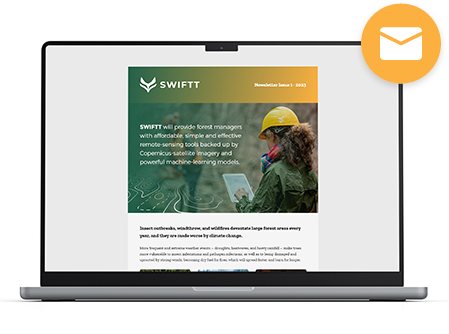The SWIFTT project develops a platform that will offer forest managers an affordable, easy-to-use, and effective forest monitoring service by utilising Copernicus satellite imagery and advanced machine learning models.
As such, the consortium deployed a large-scale survey targeting key representatives of the forestry sector, with representativeness in geography and forest size, to clarify their needs and their capacity in terms of data collection, which will help the SWIFTT partners to better adapt the platform to meet the needs of the forestry community. By participating, the survey respondents had the opportunity to be invited to beta-test the SWIFTT platform.
The survey was developed in English and machine-translated into all official EU languages to improve its reach.
Main Results
- The SWIFT Survey received 180 responses from forest managers owners and other forestry stakeholders.
- Surveyed European foresters are concerned the threat to their forests posed by bark beetles, droughts, wildfires, and storms, among others. They are also concerned with climate change and its effects. This indicates an agreement with the SWIFTT project ambition and foreseen results.
- Surveyed foresters do not use a digital tool to monitor sanitary aspects of their forests. However, they would like a tool that combines both early warning systems and near-real time damage assessment. This indicates a huge market potential for the SWIFTT platform.
- The majority of the respondents would like to participate in the beta-test of the SWIFTT platform. While most of the potential beta-testers would be willing to collect data to train the SWIFTT models. This indicates enthusiasm with the SWIFTT solution and willingness to help improving the platform.
Find below the complete survey results:
1. Survey Respondents Profile
Firstly, survey respondents were asked questions to characterize their profile and their organization.
- The respondents are forest managers (53%), and their organisation is mostly involved in “Silviculture, conservation, and other forestry activities” (68%).
- Most are freelancers (33%) or operate out of a private organization. These are small organisations, either family owned (28%) or with up to 9 employees (32%).
- The majority of the survey respondents operate in Germany (55), France (47), Italy (26), and Belgium (17), where they take care of majority Coniferous Forests.





2. Survey Respondents Concern for Forest Threats
Next, foresters were asked about their concern for and damage suffered due to forest threats
- Regarding threats to their forests, the respondents are mostly concerned about bark beetles, droughts, wildfires, and storms.
- 80% have suffered damages or losses due to one of the surveyed threats, while only 34% have received any compensation for it.
- Among those who did, 80% received compensations from their government.


3. Survey Respondents Concern for Climate Change
Survey respondents were also asked about their concern for climate change and its effects
- 67% respondents are very concerned or extremely concerned with climate change.
- 88% have noticed changing in climate conditions in their forests. Most of which are related to droughts (43%) and changes in precipitations (32%).
- 69% have taken measures to mitigate extreme events related to climate change. Most of these (71%) have changed species in their forests to less vulnerable ones.



4. Survey Respondents Use of Digital Tools
Additionally, respondents were asked questions to characterize their use of digital tools in managing their forests.
- Most (79%) respondents do not use a digital tool to monitor sanitary aspects of their forests.
- Among those who do, 45% use it for bark beetle detection.
- The respondents have mixed opinions on the trade-off between monetary cost and other aspects of a digital tool.
- However, they would like a tool that combines both early warning systems and near-real time damage assessment.



5. Data Collection and Sharing
Finally, they were asked about their willingness to share their database, to beta-test SWIFTT and perform data collection for the project.
- 67% of the respondent’s organisations have not kept a database of damaged forests.
- Among those who do, 53% is willing to share this data.
- The majority (51%) of the respondents would like to participate in the beta-test of the SWIFTT platform.
- While 75% of the potential beta-testers would be willing to collect data to train the SWIFTT models.


